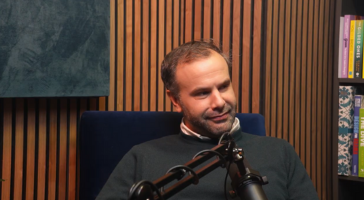
Hiring for the Future of Energy
23 July 2025Why 2025 is the Year of Digital Workers
Tech has stopped being a grudging necessity. It’s now the secret weapon that businesses use to rethink everything, from how they work, to what they sell.
In this episode of Next Time Around, “The Energy Transition: How Data is The Fuel for New Growth”, Alex Baggallay from Salesforce digs into how data and AI are completely changing the old world order of work, especially for industries like automotive and energy.
His take is that the future belongs to “digital workers” who boost human teams and transform customer experiences.
If you want to know how companies will go from selling products to selling lifestyles and why 2025 is the big year for this shift, listen up.
From products to experiences
Alex painted a picture of how technology went from being an afterthought to the main event. He points to the car industry as an example.
“Now, cars are essentially mobile phones with wheels or hyper powered devices with wheels. And car manufacturers are now lifestyle experience companies. They’re having to understand how they can not only deliver the customer from A to B, but provide ancillary services, connect with new businesses, build ecosystems, [and] build partnerships”
Energy is following the same path. Alex says customers now want more than just energy bills. They want their energy supplier to feel like part of their home life, smart, personalised, and trustworthy.
What’s changing behind the scenes
One of the biggest shifts Alex highlights is how businesses now treat data. It’s no longer a leftover or an afterthought, but rather the fuel that powers new services, sharper decisions, and more personalised experiences.
“… data is the fuel of customer experience. We are all leaving a trail of data everywhere we go, from driving our car to turning the heating on, to using the toaster in the morning. Everything we do leads a trail of data, and I think it’s the responsibility of companies to collect that data in a trusted way, in the right way.”
AI helps speed things up, checking data quality, spotting patterns, and turning raw information into something useful, but the real transformation is cultural. Companies need to rethink how they collect and use data across every team, not just in IT.
That’s where digital workers come in: software agents that handle routine tasks like data entry or processing. Alex says they’ll soon be as common as human colleagues, quietly reshaping how businesses operate from the inside out.
“… Most businesses, or most industries, their business model has been defined by human labor. Now that underpinning element is changing, there’ll be human labor plus digital labor. So the economics, the business models, the services, all of that’s going to get reshaped in the next five to 10 years, and every industry is going to come out with a new business model, [and] a new way of working.”
Bringing it home
A lot of this talk about data, software, and transformation can sound abstract. But it’s already reaching people’s homes. Even if they don’t quite realise it yet.
As Richard put it:
“If I’m talking to my dad about Home Energy Management and that whole space, you know, he’ll sort of say, ‘Well, I don’t really understand what you’re talking about.’”
He’s not alone. Many people still think of energy in transactional terms, like bills, tariffs, kWh. But the shift that’s happening is much bigger. Energy is becoming something you can actively manage, personalise, and interact with. It’s part of your daily life now, like your phone, your broadband, your EV charger.
That change is cultural as much as technical. And as Alex points out, it’s upending how suppliers think about their role in people’s lives.
The old productivity equation is broken
According to Alex, how businesses measure productivity needs a serious update. It’s no longer about how many full-time employees you have, but how effectively you can scale their output with the help of AI.
That’s why his advice is to “…think big, start small, and scale fast.” You don’t need to overhaul everything overnight. Start by solving one real problem with a practical AI solution.
Alex’s enthusiasm for digital workers is contagious but also a bit unnerving. The idea that software bots will soon sit alongside us doing parts of our jobs can feel like sci-fi or a threat. But he frames it as a productivity boost.
“…the thing that people [are] leaping to [that] digital workers means x is going to replace y… It’s not actually the case. It’s about augmenting and enhancing.”
These ‘digital workers’ will free humans to focus on higher-value, creative tasks, as he sees it. For example, Alex relates an anecdote about how a marketing team can use digital workers to tailor campaigns across multiple geographical regions and time zones at once—something impossible to do manually at scale.
“We were always defined by how many FTE (full-time employees) do we have that allows us to produce x amount of productivity. That equation is broken now… You can achieve far more output from the same FTE. I would really encourage companies to embrace it, because if they don’t, to be candid, others will, and you’ll be left behind.”
Final thoughts
AI and data aren’t some distant future, they’re already remaking industries and work itself. 2025 has marked a turning point where digital workers become everyday colleagues and businesses that adapt will pull ahead.
Energy and automotive companies who see beyond the product, to the lifestyle, the experience, the seamless integration, will be the ones who thrive.
Small steps in AI and partnerships today can set you up for a smarter, more connected tomorrow.
Want to see what this looks like in practice? Book a demo with the Powerverse team.

